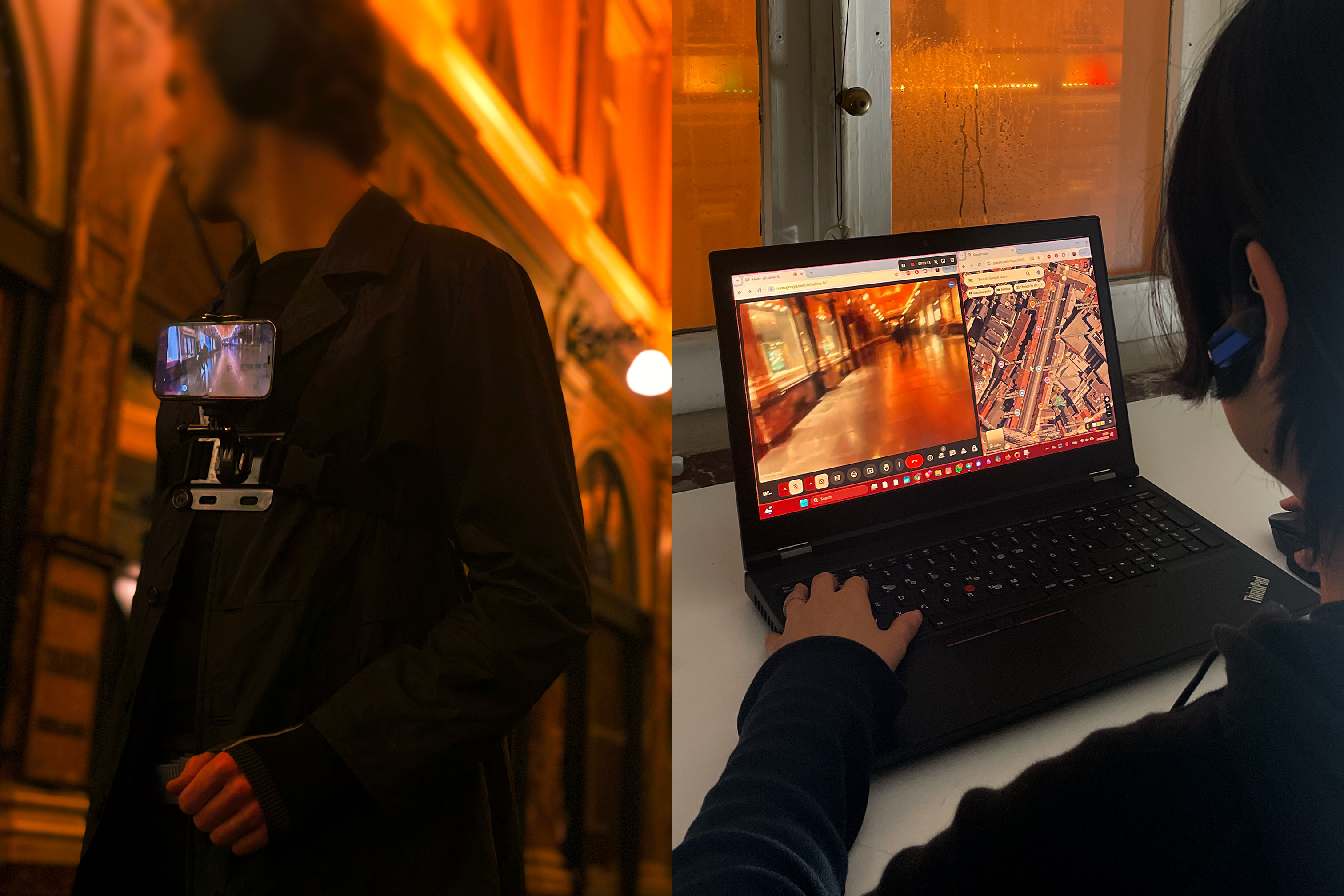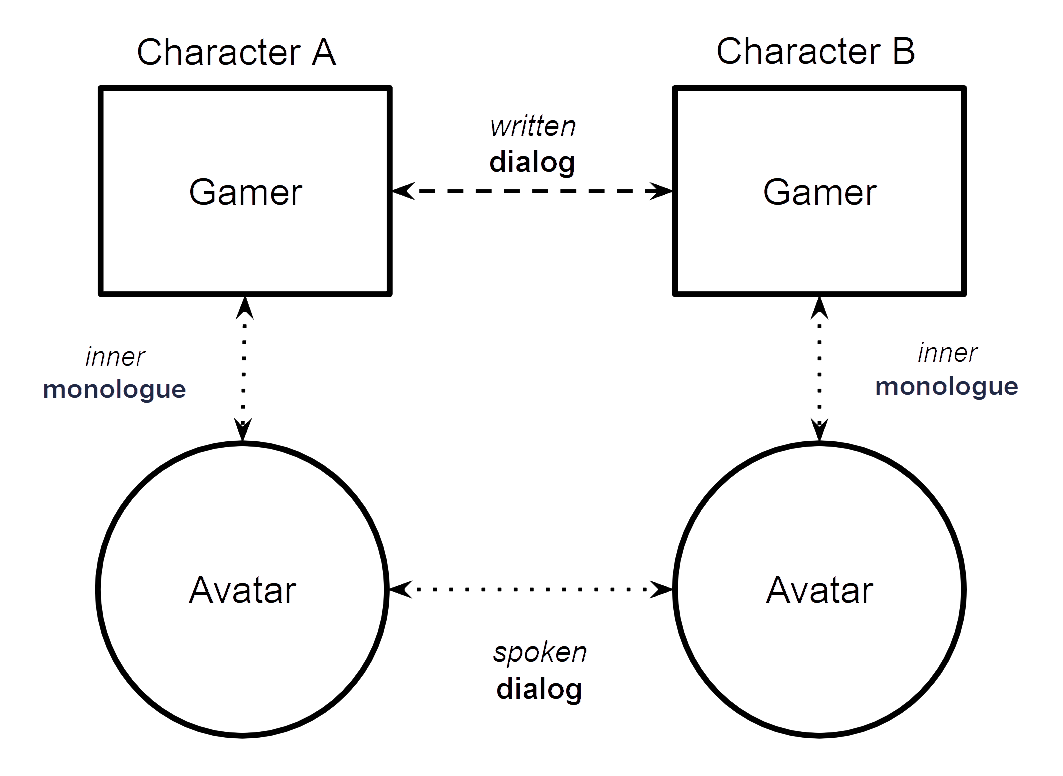
Temporal Worlding
Remote Reality Games as Spatio-Temporal Navigation and Narrationby Steph Holl-Trieu & Carina Erdmann
Temporal Worlding is a Remote Reality Game that blends elements of digital gaming and Live Action Role-Playing (LARP). It uses the framing of a video game in which two players role-play the dynamic between the gamer and the avatar.
The game invites players to change how they move through worlds by altering their perception of time. Beyond standardised clock time and our own body clocks, the game expands experiences of time to encompass our socialised senses of the future, past, and present. In an unfolding dialogue, players come to terms with how they are always conditioned by an exterior relation—to another person, pace, technology, chronometer, or institution.
Using role-play, nonlinear narration and collective worlding the game scores alternative modes of experiencing time nested between our existing temporal infrastructures.

The question of systems of time-keeping and the structuring of temporality is central to design processes and experiences of games. The very foundational theories of games and play (Huizinga, 1950; Caillois, 2001) argue that ludic spaces are defined by clearly delineated temporal durations that separate game temporalities from everyday lived experience. Allowing for the navigation of time through pausing, slowing down, rewinding, replaying, reactivating time, video games offer entirely new and malleable experiences of temporality (Hanson, 2018). In Live-Action-Role-Playing (LARP), time and temporality is an equally crucial tool to set game worlds apart from consensual reality, whether it is through the setting of a time frame to define the magic circle, meta techniques that allow scenes to be played out in non-chronological time, or fluid time structures to pursue multiple plotlines simultaneously.
As a Remote Reality Game, Temporal Worlding proposes a game set up in which half of the participants are on site and half of them call in from around the world. Participants are paired and become one character with two bodies: player and avatar. Together, they go on a walk, in which the player directs the avatar and instructs their movement via voice call. The game play is facilitated through a narrative that overlays the real world environment of the players with a speculative framing using temporal navigation systems and narrative structures from games. While the workshop investigates hybrid or remote interaction, it also introduces embodied forms of knowledge production, tuning into cyclical and linear rhythms that condition the body through somatic exercises.
Through different temporal logics the players record their avatars' narrations in a shared spatio-temporal map (a shared online whiteboard that connects all players), channelling the avatars’ concrete embodied experiences into an abstract overview. In an intimate exchange in which the participants rely on each other's asymmetric means of perception, the avatars’ bodies become the interfaces for the players to experience the city. The players trace and map the pathways of their real-life avatars walking through the city leveraged as gamespace.
This project is an invitation to analyse, reflect on and conspire with and against modes of temporal worlding. Temporal worlding can be understood as the making and unmaking of worlds through infrastructures of time and temporal practices. From the first railway accidents to the logistics of global supply chains, the imposition of labour regimes and the affordances of high-frequency trading, the demand for synchronised clock time is inseparable from colonial conquest, militarism, financial and industrial capitalism. Within, against and beyond the social control of time, we find uneasy, weird and wayward temporalities produced through lived experience and experimental navigation.
We propose the use of role-play, nonlinear narration and collective worlding to examine and construct livable alternatives to existing infrastructures. Our aim is to experience and negotiate divergent conceptions of time as they exist within consensual reality. Negotiating the sometimes paradoxical patterns as well as conducive synergies that emerge between these temporal practices, we hope to develop the social and collective agency to launch operative fictions and heterogeneous worlds that have the potential to disrupt, undermine and reshape ‘our time(s)’.
PAST WORKSHOPS:
Goethe Institute, March / April 2025, Beijing/ Shanghai
au JUS, February 19, 2025, Brussels
DIGRA Conference 2024, July 1-5, 2024, Guadalajara
Kollektiv Zirkusgasse, June 14, 2024, Vienna
Academy of Fine Arts Vienna – Art and Space: Spatial Strategies , March 14, 2024, Vienna
References:
Caillois, Roger. Man, Play, and Games. Translated by Meyer Barash. University of Illinois Press, (1961) 2001.
Hanson, Christopher. Game Time. Understanding Temporality in Video Games. Indiana University Press, 2018.
Harviainen, J. Tuomas. “Time and Temporality in Live-Action Role-Playing”. Homo Ludens 1(11), 2018.
Huizinga, Johan. Homo Ludens: A Study of the Play Element in Culture. Beacon Press, 1950
Koljonen, Johanna, et. al. LARP Design : Creating Role-Play Experiences. Knudepunkt, 2021
Lefebvre, Henri. Rhythmanalysis : Space Time and Everyday Life. Continuum, 2004
Phillips, Rasheedah. “Dismantling the Master('s) Clock[work Universe], Pt. 1”, Space-Time Collapse I: From the Congo to the Carolinas, Black Quantum Futurism, The AfroFuturist Affair/House of Future Sciences Books, 2016, 15-34
Sharma, Sarah. In the Meantime : Temporality and Cultural Politics, Duke University Press, 2014
Thompson, E.P. “Time, Work-Discipline, and Industrial Capitalism”. Past & Present, Volume 38, Issue 1, December 1967, Pages 56–97, https://doi.org/10.1093/past/38.1.56
Volmar, Axel, and Kyle Stine, editors. Media Infrastructures and the Politics of Digital Time: Essays on Hardwired Temporalities. Amsterdam University Press, 2021. https://doi.org/10.2307/j.ctv1xcxr3n.
Zhexi Zhang, Gary. Catastrophe Time! Strange Attractor Press, 2023
Goethe Institute, March / April 2025, Beijing/ Shanghai
au JUS, February 19, 2025, Brussels
DIGRA Conference 2024, July 1-5, 2024, Guadalajara
Kollektiv Zirkusgasse, June 14, 2024, Vienna
Academy of Fine Arts Vienna – Art and Space: Spatial Strategies , March 14, 2024, Vienna
References:
Caillois, Roger. Man, Play, and Games. Translated by Meyer Barash. University of Illinois Press, (1961) 2001.
Hanson, Christopher. Game Time. Understanding Temporality in Video Games. Indiana University Press, 2018.
Harviainen, J. Tuomas. “Time and Temporality in Live-Action Role-Playing”. Homo Ludens 1(11), 2018.
Huizinga, Johan. Homo Ludens: A Study of the Play Element in Culture. Beacon Press, 1950
Koljonen, Johanna, et. al. LARP Design : Creating Role-Play Experiences. Knudepunkt, 2021
Lefebvre, Henri. Rhythmanalysis : Space Time and Everyday Life. Continuum, 2004
Phillips, Rasheedah. “Dismantling the Master('s) Clock[work Universe], Pt. 1”, Space-Time Collapse I: From the Congo to the Carolinas, Black Quantum Futurism, The AfroFuturist Affair/House of Future Sciences Books, 2016, 15-34
Sharma, Sarah. In the Meantime : Temporality and Cultural Politics, Duke University Press, 2014
Thompson, E.P. “Time, Work-Discipline, and Industrial Capitalism”. Past & Present, Volume 38, Issue 1, December 1967, Pages 56–97, https://doi.org/10.1093/past/38.1.56
Volmar, Axel, and Kyle Stine, editors. Media Infrastructures and the Politics of Digital Time: Essays on Hardwired Temporalities. Amsterdam University Press, 2021. https://doi.org/10.2307/j.ctv1xcxr3n.
Zhexi Zhang, Gary. Catastrophe Time! Strange Attractor Press, 2023